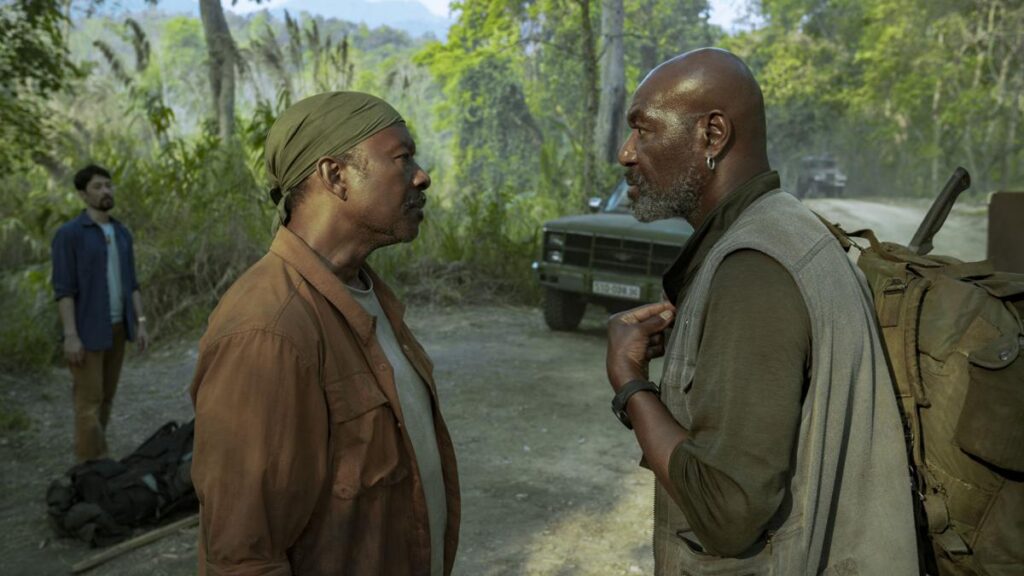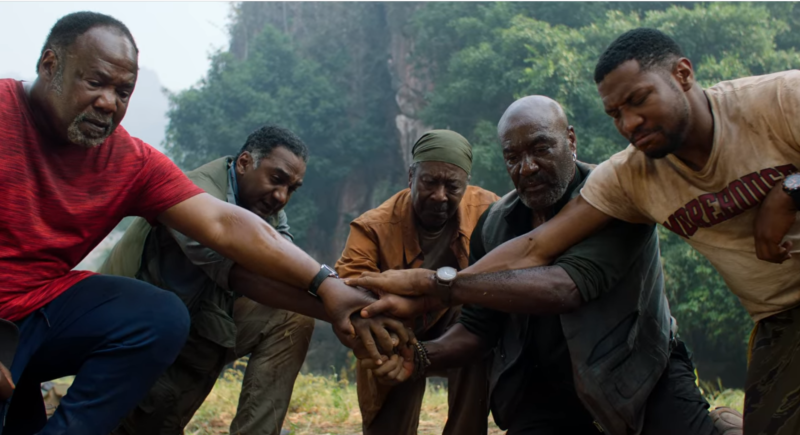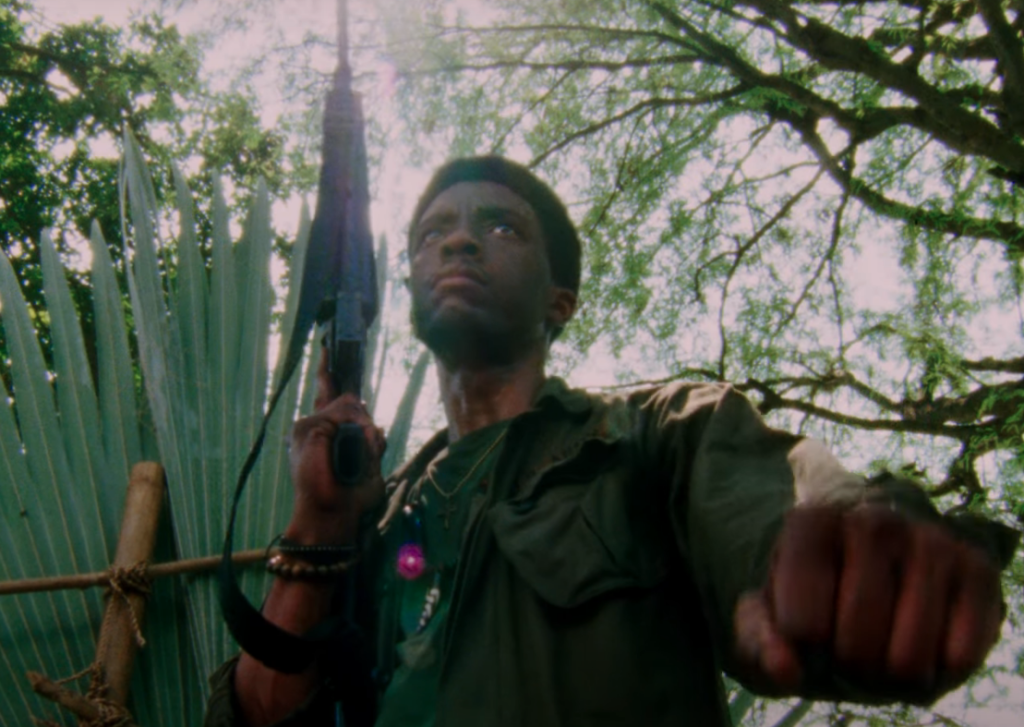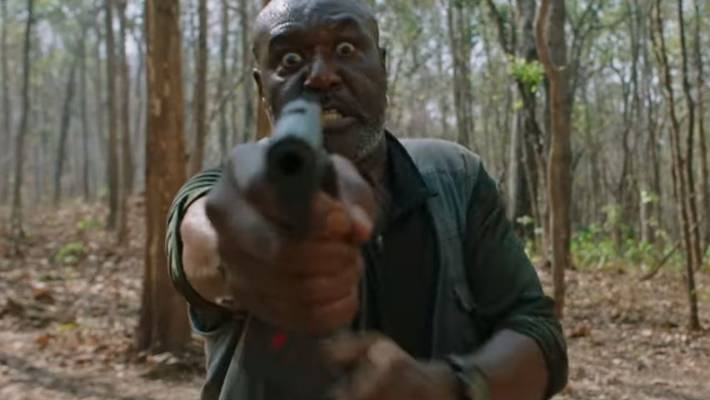
Spike Lee’s Da 5 Bloods is frequently breathtaking and just as frequently stultifying. It conjures images and sequences of enormous power; it also dilutes that power, thanks to the sloppiness of its storytelling and the willful indiscipline of its creator. This can be frustrating, but it isn’t especially surprising. Lee is a rare director not just for his filmmaking gifts, but for the breadth of his ambition; he’s a crowd-pleaser who wants to make you angry, a fire-breathing preacher who wants to show you a good time. His best movies (Do the Right Thing, Malcolm X, 25th Hour) harmonize these seemingly contradictory impulses, functioning as robust works of eye-catching pulp without sacrificing their thematic relevance or political charge.
Da 5 Bloods is not on their level. Its mixture of entertainment and agitprop is ungainly; the competing ingredients clash rather than complement. Yet it remains a furiously watchable film—heavily flawed, yes, but coursing with energy and personality. You may chafe against its awkward blend of tones, but you are unlikely to forget its vigor or its fury.
That Lee is angry should not come as a shock. For more than three decades, he has been using cinema to vent his rage, and to shine a harsh spotlight on society’s ugly truths. In recent years, as the American experiment has grown increasingly precarious, his cris de coeur have acquired ever greater urgency and force. His prior film, BlacKkKlansman, was set in the 1970s, but its finale memorably accelerated its timeline, juxtaposing grim past events with vulgar contemporary ones. Da 5 Bloods essentially operates in reverse: Most of its action takes place in the present day, with periodic flashbacks and torrents of archival footage. Among its many messages is the implication that anti-Black prejudice is not a historical footnote that has waned over time, but is an embedded fixture in American life whose toxicity endures to this day. Oh, and there’s also buried treasure.

It takes some time before that loot is uncovered, but from the film’s very first frame—a clip of Muhammad Ali decrying his country’s intervention in Vietnam—Lee’s singular style is evident. Working with the hyperactivity of a knowledgeable, over-caffeinated honor student, he spends the movie’s opening minutes rocketing through seminal moments from the era: Tommie Smith and John Carlos, the Kent State massacre, Nixon’s resignation, etc. It isn’t a particularly illuminating introduction, but it does establish the picture’s pace, which is somehow both fast and slow at once. Da 5 Bloods runs 154 minutes, and they’re hardly streamlined, making room for fatty subplots and odd digressions. But even during scenes of relative torpor, Lee is always doing something: random cutaways, sudden zooms, playful title cards. (In his lone appearance, Donald Trump is captioned as “President Bone Spurs”.) His restlessness is both irritating and arresting; you may grow annoyed, but you won’t be bored.
Despite its frenetic bells and whistles, its haphazard culs-de-sac and roads to nowhere, the main plot of Da 5 Bloods is fairly straightforward. Four Black veterans—even-keeled Otis (Clarke Peters), hotheaded Paul (Delroy Lindo), pigeon-toed Eddie (Norm Lewis), and agreeable Melvin (Isiah Whitlock Jr.)—have reunited in Saigon Ho Chi Minh City, nearly a half-century after they served together in one of our nation’s most infamous wars. With the assistance of a guide (Johnny Trí Nguyen), their ostensible plan is to return to the jungle and recover the body of a fallen comrade, “Stormin’ Norman” (Chadwick Boseman), who was killed in action and whose remains were never brought home. Secretly, and with the help of Otis’ old flame (Lê Y Lan) and an enterprising fence (Jean Reno), they intend to exhume a cache of gold bars that they found and entombed all those years ago.

The lengthy opening stretch of Da 5 Bloods—in which its four elderly ex-soldiers reminisce as they revisit the war-ravaged ground of their youth, accompanied by Paul’s eager adult son, David (Jonathan Majors, from The Last Black Man in San Francisco)—is its most chaotic, and its least interesting. Lee regularly flashes back to his troops’ military service, attempting to dramatize the horrors that have haunted these proud men for decades. (In so doing, he declines to apply any de-aging technology, distinguishing this Netflix original from The Irishman; all this means is that the actors plainly look too old for this shit, which isn’t really a problem, given the heightened, vaguely unreal nature of everything else going on.) These sequences are noisy, blurry, and not especially persuasive; lots of ordnance is fired, and hosts of soldiers get struck by gunfire or consumed in orange fireballs, but Lee doesn’t seem all that interested in combat strategy or spatial coherence. (He does futz around with aspect ratio; the ’70s scenes are shot in a squarish frame, which contrasts with the anamorphic look of the present-day material, though he eventually settles on standard-order widescreen.) The editing is busy but not purposeful, and the sporadic recalls of the war do little to deepen the characters.
His actors prove more helpful, most notably Lindo. His Paul is a serious piece of work; inherently mistrustful and stricken with PTSD, he’s hostile and sullen, with a perpetual scowl on his face and—to the disbelief of his compatriots—a MAGA hat on his head. That ideology seems implausible for the hero of a Spike Lee joint, but the beauty of Lindo’s wild, operatic performance lies in the way he gradually humanizes Paul, refining his belligerence without ever really making him likable. Crucially, he’s counterbalanced by Peters, whose Otis is grounded and logical, suppressing his own pain in the service of the mission.
Still, Lee’s hectic, more-is-more approach makes it difficult to invest much energy in any of the numerous subplots that he’s concocted, be it Paul’s dubious parenting, Otis’ discovery that he has a half-Vietnamese daughter, Eddie’s financial troubles, David’s flirtations with a French activist (with bonus foreshadowing!), and more. The script, which was originally written by Danny Bilson and Paul De Meo for Oliver Stone, was reworked by Lee and Kevin Willmott; the latter pair did the same thing with BlacKkKlansman, but the result here is far patchier, resulting in a story that lurches rather than flows. Eventually, however—specifically, once one character wanders away from camp and inadvertently summons a literally explosive jolt—the film’s focus begins to sharpen. What began as a bulky jumble of genres—war epic, didactic polemic, geezer comedy—narrows into something entirely unexpected: an action movie.

And a pretty good one. The back half of Da 5 Bloods features a number of gripping set pieces, all staged with tension and ingenuity. The highlight is an inspired display of athletic teamwork, with Paul transforming from malcontent to leader. (That scene also name-checks Edwin Moses; unable to stop himself, Lee needlessly interrupts things with an abrupt push-in on an old photo of the gold medalist.) There are kidnappings and escapes, alliances and betrayals, deadly shootouts and selfless acts of heroism. The action isn’t always crisp—a pivotal sequence revealing Stormin’ Norman’s fate is too rushed to deliver the desired impact—but it’s more concentrated than what precedes it, as Lee generates forward momentum while still relaying his various themes.
One of which, it turns out, is movies themselves. Lee may take justifiable umbrage at American governance, but he’s a devoted student and fan of American cinema, and Da 5 Bloods pays homage to various classics. Apocalypse Now is the obvious touchstone, and not just because “Ride of the Valkyries” appears on the soundtrack; a delightful early shot finds the four aged leads grooving their way toward the camera as a neon sign bearing the title of Francis Ford Coppola’s epic beams in the background. A much later scene features Otis quoting the famous final exclamation from The Bridge on the River Kwai. And Paul’s fraying mental state recalls Humphrey Bogart in The Treasure of the Sierra Madre; a long take of a soliloquizing Lindo slashing his way through the forest is mesmerizing, not so much because of his specific words but because his twitchy director finally exhibits a willingness to sit still. (As a treat for patient viewers, Whitlock Jr. waits for roughly two hours before delivering his signature catchphrase, which he made meme-worthy in The Wire but originally deployed in 25th Hour.)
The evolution of the motion picture is just one type of growth contemplated by Da 5 Bloods, a film intently concerned with historical progress—and the lack of it. It’s been more than 30 years since Lee’s character hurled a trash can through the storefront of Sal’s Pizzeria at the end of Do the Right Thing, and the country is still on fire. As his new movie hurtles toward its messy, powerful, overstuffed conclusion, it never quite synchronizes its depiction of past carnage in Southeast Asia with its distress over present stateside brutality. Yet the point is clear enough: Then and now, the battle for racial equality rages on. Lee and his characters keep fighting. But some wars never seem to end.
Grade: B
Jeremy Beck is the editor-in-chief of MovieManifesto. He watches more movies and television than he probably should.
